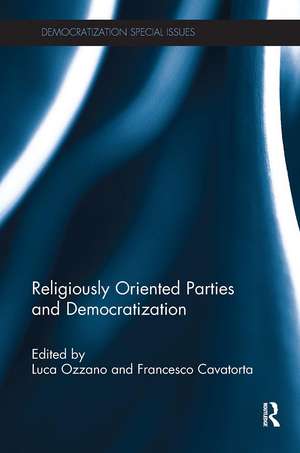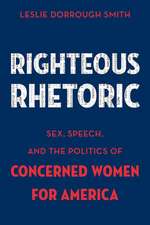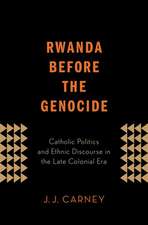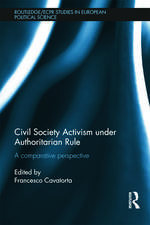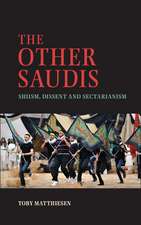Religiously Oriented Parties and Democratization: Democratization Special Issues
Editat de Luca Ozzano, Francesco Cavatortaen Limba Engleză Paperback – 14 oct 2024
This book was published as a special issue of Democratization.
| Toate formatele și edițiile | Preț | Express |
|---|---|---|
| Paperback (1) | 257.68 lei 6-8 săpt. | |
| Taylor & Francis – 14 oct 2024 | 257.68 lei 6-8 săpt. | |
| Hardback (1) | 763.39 lei 6-8 săpt. | |
| Taylor & Francis – 21 mar 2014 | 763.39 lei 6-8 săpt. |
Din seria Democratization Special Issues
-
 Preț: 257.47 lei
Preț: 257.47 lei -
 Preț: 258.13 lei
Preț: 258.13 lei -
 Preț: 378.12 lei
Preț: 378.12 lei - 17%
 Preț: 258.09 lei
Preț: 258.09 lei -
 Preț: 409.51 lei
Preț: 409.51 lei -
 Preț: 408.54 lei
Preț: 408.54 lei -
 Preț: 416.22 lei
Preț: 416.22 lei -
 Preț: 255.45 lei
Preț: 255.45 lei - 17%
 Preț: 258.09 lei
Preț: 258.09 lei - 12%
 Preț: 312.43 lei
Preț: 312.43 lei - 18%
 Preț: 995.70 lei
Preț: 995.70 lei -
 Preț: 415.24 lei
Preț: 415.24 lei - 17%
 Preț: 259.31 lei
Preț: 259.31 lei -
 Preț: 201.31 lei
Preț: 201.31 lei -
 Preț: 416.22 lei
Preț: 416.22 lei - 26%
 Preț: 850.19 lei
Preț: 850.19 lei - 25%
 Preț: 497.37 lei
Preț: 497.37 lei -
 Preț: 416.22 lei
Preț: 416.22 lei - 12%
 Preț: 312.43 lei
Preț: 312.43 lei - 17%
 Preț: 140.54 lei
Preț: 140.54 lei - 17%
 Preț: 259.98 lei
Preț: 259.98 lei - 12%
 Preț: 299.52 lei
Preț: 299.52 lei - 12%
 Preț: 298.41 lei
Preț: 298.41 lei - 18%
 Preț: 1216.52 lei
Preț: 1216.52 lei - 25%
 Preț: 525.19 lei
Preț: 525.19 lei - 17%
 Preț: 258.30 lei
Preț: 258.30 lei
Preț: 257.68 lei
Preț vechi: 310.22 lei
-17% Nou
Puncte Express: 387
Preț estimativ în valută:
49.31€ • 51.15$ • 41.12£
49.31€ • 51.15$ • 41.12£
Carte tipărită la comandă
Livrare economică 27 martie-10 aprilie
Preluare comenzi: 021 569.72.76
Specificații
ISBN-13: 9781032928548
ISBN-10: 1032928549
Pagini: 184
Dimensiuni: 156 x 234 mm
Greutate: 0.34 kg
Ediția:1
Editura: Taylor & Francis
Colecția Routledge
Seria Democratization Special Issues
Locul publicării:Oxford, United Kingdom
ISBN-10: 1032928549
Pagini: 184
Dimensiuni: 156 x 234 mm
Greutate: 0.34 kg
Ediția:1
Editura: Taylor & Francis
Colecția Routledge
Seria Democratization Special Issues
Locul publicării:Oxford, United Kingdom
Public țintă
AcademicCuprins
1. Introduction: religiously oriented parties and democratization 2. The many faces of the political god: a typology of religiously oriented parties 3. The perils of polarization and religious parties: the democratic challenges of political fragmentation in Israel and Turkey 4. Moderation through exclusion? The journey of the Tunisian Ennahda from fundamentalist to conservative party 5. Refining the moderation thesis. Two religious parties and Indian democracy: the Jana Sangh and the BJP between Hindutva radicalism and coalition politics 6. Ahab and the white whale: the contemporary debate around the forms of Catholic political commitment in Italy 7. Religious parties in Chile: the Christian Democratic Party and the Independent Democratic Union 8. Religion and democratization in Northern Ireland: is religion actually ethnicity in disguise? 9. Conclusion: reassessing the relation between religion, political actors, and democratization
Notă biografică
Luca Ozzano is Assistant Professor of Political Science at the University of Turin, in Italy. His research focuses on the relation between religion and democracy, both in theoretical terms, and in relation to case studies such as Italy and Turkey.
Francesco Cavatorta is Associate Professor of Political Science at Université Laval in Québec, Canada. His research broadly focuses on the politics of the Arab world and specifically on Islamist movements, Islamist parties and democratization.
Francesco Cavatorta is Associate Professor of Political Science at Université Laval in Québec, Canada. His research broadly focuses on the politics of the Arab world and specifically on Islamist movements, Islamist parties and democratization.
Descriere
The book provides an original typology of religiously oriented parties that is a useful guide to understand their nature, their organisational models and, crucially, how they might impact on democracy and democratization in a number of different contexts across the world.
It was published as a special issue of Democratization.
It was published as a special issue of Democratization.
